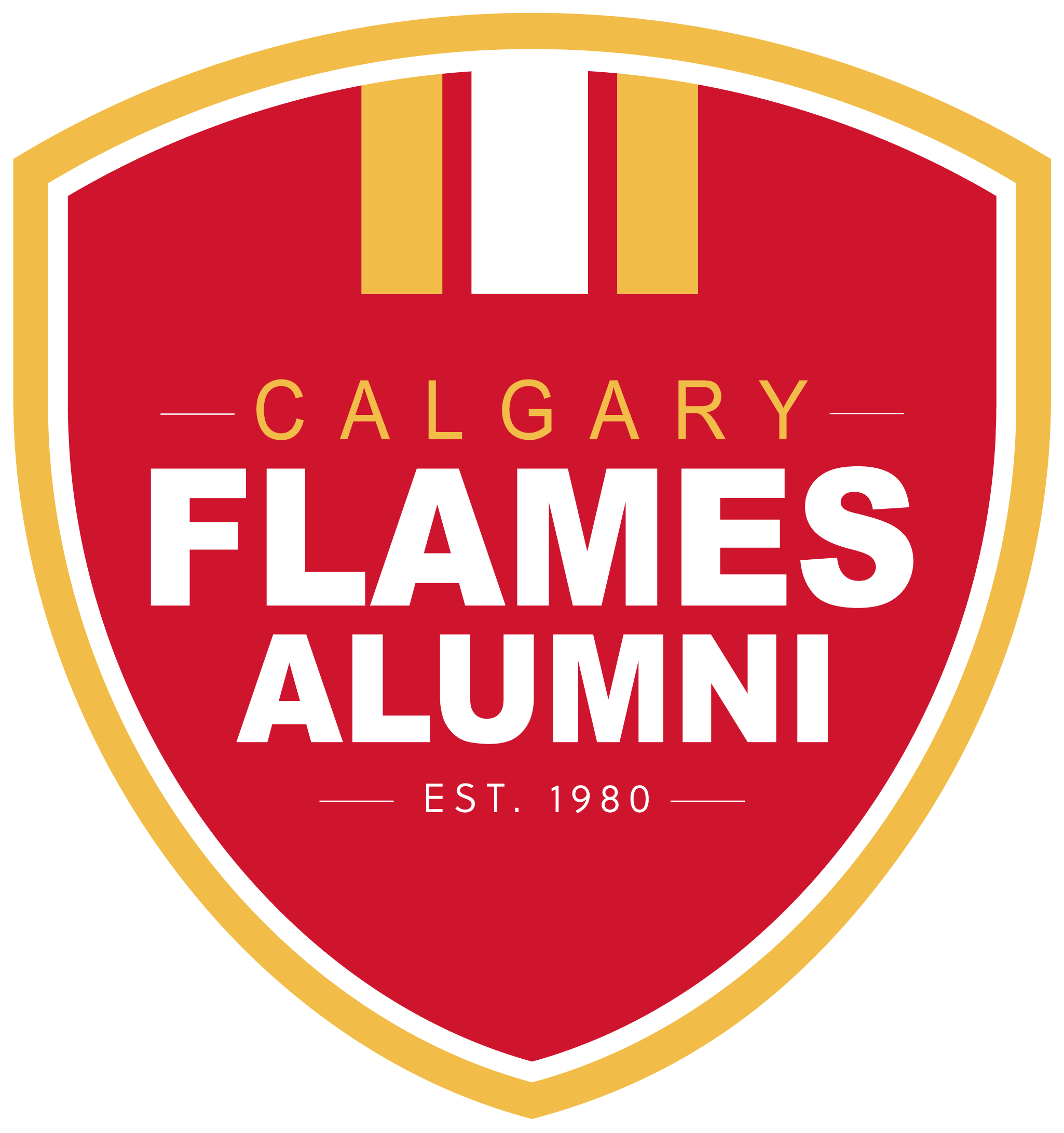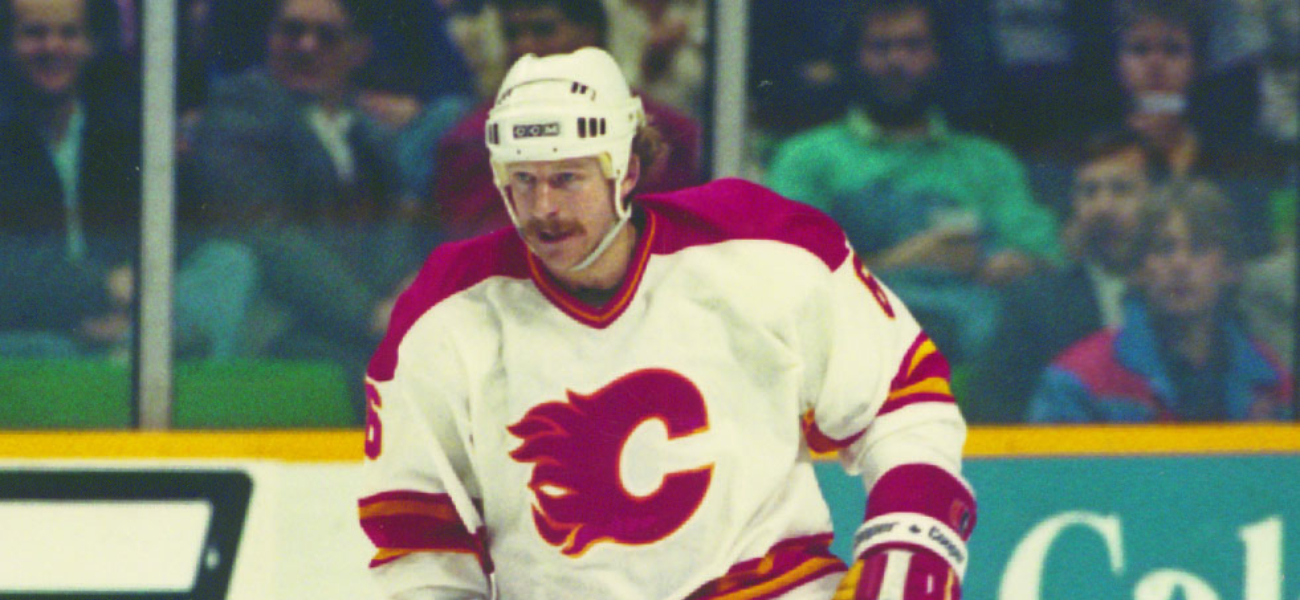For a guy who’d been reared in the city, cut his teeth guarding the blue line for the AJHL Canucks and spent a year out at Foothills Arena as a student-athlete, the idea of returning home and pulling on that Flaming C jersey was far from a be-all, end-all.
“I’d come from St. Louis, was very fond of that organization and the characters around it,” confesses Terry Johnson today. “I’d kind of found a professional home there. So it was, quite candidly, a difficult thing to be traded, anywhere; even to come home-home.
“Then here in Calgary it’s pretty fair to say I wasn’t playing as prominent a role as I had been. Just because I was from here didn’t really change much for me.
“I wasn’t hanging out with my friends or anything. I was here to do a job.”
The year was 1986. The notebook-toting, nose-pulling, Badger Bob Johnson was in charge behind the bench. The Calgary Flames were considered a longshot at best.
On Feb. 1, to bolster his line-up, wily GM Cliff Fletcher acquired super-sniper, tungsten-tough right winger Joe Mullen, along with defencemen Johnson and Rik Wilson from the Blues in exchange for defenceman Charlie Bourgeois along with wingers Eddy Beers and Gino Cavallini.
With Mike Vernon replacing Reggie Lemelin in goal, and improved by the trades for Mullen, four-time Stanley Cup champ John Tonelli and enforcer Nick Fotiu, the astonishing, prohibitive-underdog Flames would dethrone the defending champion Edmonton Oilers en route to an improbable Stanley Cup finale versus the fabled Montreal Canadiens.
The Habs prevailed in six games that series but the locals had succeeded in accomplishing the impossible, slaying the mighty Oil Drop, and in the doing begun to finalize the blueprint for the ’89 championship run.
In October of ’86, after 41 games as a Flame, 17 of those during the playoff push, Johnson, who’d originally signed as a free agent with the Quebec Nordiques, was shipped to the Toronto Maple Leafs for the pugnacious Jim Korn.
“As the years have gone, people introduce me as a former Flame,” muses Johnson. “And I am, of course – technically. But since my tenure was pretty short, even when I was playing here I didn’t think of myself in those terms.
“More and more, though, I’ve come to appreciate that time. And certainly the group of people we had here were simply tremendous, a few of them with the alumni now, people like Colin Patterson and Perry Berezan and all those guys.
“They’ve done a tremendous amount for the community. Bob Murdoch was coaching the defence. Al MacNeil would come down and give you a few words of his wisdom.
“So at the time it didn’t seem too meaningful to me. I was pretty disappointed and I don’t know if I can honestly say the hockey worked out really well for me here.
“But now, looking back, I’m really glad I got the opportunity to come here and play for the organization.”
Two years later, after spending much of the time with the Leafs’ AHL affiliate in Newmarket, Ont., Johnson decided to retire.
As mentioned, he’d attended the U of C for the one season, ’78-79, before turning pro, suiting up for the George Kingston-coached Dinos while hitting the books, attending commerce classes.
“Kind of of a risky proposition, to be candid, leaving school when I did to turn pro,” he acknowledges. “I wasn’t a high flyer, by any means. So I promised myself that no matter what, when I was done, finished, I’d be coming back and finishing my education, getting my degree.
“So I had a clear post-hockey path. And when I was actually done, there was no hesitation. That part was easy. The hard part for me was determining what in hell would I be interested in or what might I be good at.
“That was confusing. I had a lot of difficulty in nailing that down.”
Back on campus, Johnson joined the Dinos’ coaching staff, which kept him somewhat tethered to the game and helped ease the transition away.
“For sure I wanted to do something other than hockey but at the same time I had a pretty big passion for it. Coaching kind of filled that gap.
“Thing is, coaching is a full-time gig. Even if you’re an assistant coach volunteering at the university. And I was attending classes full time.
“The university level is good hockey so you’ve got to come ready.”
After completing his degree, Johnson began taking extra petroleum land-management, finance and international finance classes and tried to sort out his direction forward.
“I was always interested in the oil industry. Lots of science involved. Lots of layers of things to learn. Lots of aspects to the business.
“So I kind of thought I’d like to get into the oil industry. Growing up in Calgary also had something to do with it. The industry’s buzzing around you, you don’t quite understand it. I thought well, that would be an interesting way to go.”
While attending those extra classes, people from the oil industry paid a visit “and they said: ‘Who in here would like a job in the oil industry and doesn’t have one?’
“I remember looking around the room and thinking: ‘Geez, nobody’s putting up their hand. Maybe they’ve already got jobs.’ But me? Sure. I put up my hand. So I got a summer job working at Mobil Oil.”
The next year, another university course, and another oil company classroom visit.
“So I put up my hand again. Another job. I wouldn’t say without a lot of effort … but they made it easy coming to the university. And the oil industry was going quite well at the time. So you had some options out there without thinking what you actually wanted to do.
“All of a sudden I’m a petroleum landman/mineral rights negotiator.'”
After a long spell in a more traditional environment, for the last 11 years he’s worked in a smaller company, Baccalieu Energy Inc., named after the Baccalieu Islands located off the northwest coast of Newfoundland and located on 8th Ave. SW.
‘There are basically seven of us in the management group,” says Johnson. “Times have been tough the last few years but we’ve had a decent go of it.”

